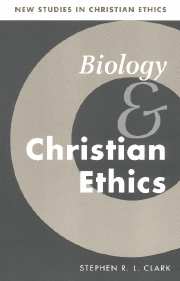Book contents
- Frontmatter
- Contents
- General editor's preface
- Preface
- Introduction
- 1 The development of Darwinian theory
- 2 Moral and metaphysical assumptions
- 3 Trying to live in nature
- 4 The biology of sin
- 5 Human identities
- 6 The goals of goodness
- 7 The end of humanity
- 8 The covenant with all living creatures
- 9 Conclusion: cosmos and beyond
- Index
8 - The covenant with all living creatures
Published online by Cambridge University Press: 02 December 2009
- Frontmatter
- Contents
- General editor's preface
- Preface
- Introduction
- 1 The development of Darwinian theory
- 2 Moral and metaphysical assumptions
- 3 Trying to live in nature
- 4 The biology of sin
- 5 Human identities
- 6 The goals of goodness
- 7 The end of humanity
- 8 The covenant with all living creatures
- 9 Conclusion: cosmos and beyond
- Index
Summary
BEGINNING FROM THE BEGINNING
The Bible's claim is that our possession of the land (and anything else we think we own) is conditional on our keeping to the covenant, whose conditions are listed in Deuteronomy chapter 28. Those conditions are regularly ignored. We easily believe that we can avoid all consequences for our sin: ‘You keep saying “This place is the temple of the Lord, the temple of the Lord, the temple of the Lord!” This catchword of yours is a lie; put no trust in it. Mend your ways and your doings, deal fairly with one another, do not oppress the alien, the orphan, and the widow, shed no innocent blood in this place, do not run after other gods to your own ruin’.
There have been many attacks on the Scriptures as being ‘anti-environmentalist’. On the contrary, so I contend, the Scriptures emphasize our duties – not as ‘stewards’, but as neighbours. It is true that Baal, in some sense a nature god, is not approved and some critics suspect – not entirely without reason – that modern pantheistic environmentalism, and New Age ideas, are exactly that sort of Baal worship. But from the very first chapter of Genesis it is affirmed that ‘being’ itself is good. ‘God could not have created a thing had he hated it, as the Wisdom says, and the mere fact that he keeps it in being is the proof that he loves it.’
- Type
- Chapter
- Information
- Biology and Christian Ethics , pp. 283 - 300Publisher: Cambridge University PressPrint publication year: 2000



